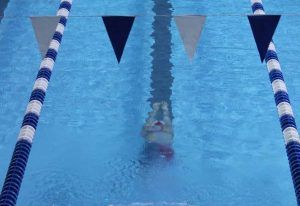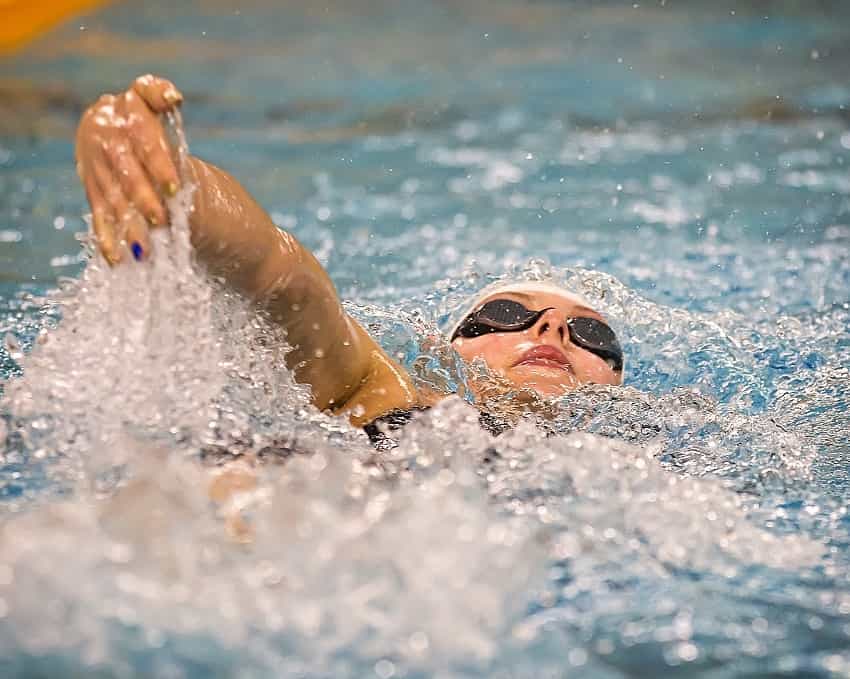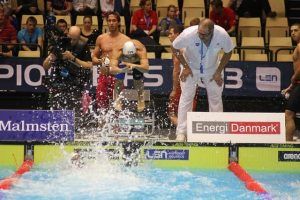
The Best Resource for New Swim Parents is Sitting in the Stands With You
For the new swim parent, getting involved with the sport can feel overwhelming. Fortunately, there is a killer resource already sitting in the stands with you.

It’s a difficult experience to watch your swimmer come up short of their goals and expectations in the pool. Even though the effort was there, the preparation was on point, the performance, for whatever reason, simply wasn’t.
For swim parents, it gets even harder trying to figure out what to say as their athlete, shoulders slumped, hair still dripping, mentally works through what they are feeling.
(Besides “I am proud of you and I love you.” This is a given.)
You want to pass on the right sense of comfort while also instilling self-confidence after a crappy swim in the pool.
You want to be realistic about their disappointment, not sugar-coating it for them, but also give them something positive to work with.
What we say is often determined by how the swimmer him-or-herself behaves afterwards. Reactions from swimmers go up and down the scale from the quiet brooder, to the emotional, inconsolable train-wreck to the time-pad puncher.
There are a couple of the more cookie-cutter approaches when it comes to talking to your athlete about his or her performance—
Dismissive: “You’ll be fine, it’s just one bad swim. Don’t worry about it.”
Supportive: “You’re a talented swimmer, that swim doesn’t represent your skill and talent.”
Silver lining: “At least you weren’t last.”
Challenging: “Yeah, you had a bad swim. So what are you going to do about it?”
Is there an alternative to the above? A way that you can be supportive, while challenging your swimmer to step up while also not being dismissive?
The next time your athlete has a performance that they aren’t so thrilled about, try this simple question–
“How can you make this the best thing to happen to you?”
There are several reasons I love this question. (I’ve used the statement version of this on numerous occasions over the years, from break-ups to injuries – “I am going to make XYZ the best thing to ever happen to me.”)
Here are five of the more prominent reasons why this angle on the “silver lining” approach should be your go-to the next time your swimmer has a bad swim–
If there is one thing we are good at being stinky at, it’s accurate self-reflection. We cover up shoddy training with excuses and over-exaggerate the good training we did do in our minds. Then when it comes to crunch time we wonder why we don’t deliver.
This is natural – after all, we do it to protect ourselves. But in reality it’s a disservice, because we never quite get down to the crux of why we performed the way we did when we create excuses and skew our training history to favor those same excuses.
When you challenge your swimmer to find the best case scenario from their bad swim they are forced to own up to their swim. The good, the bad, and the ugly parts of it.
Swimming back and forth in the warm-down pool after an asinine swim is a lonely experience. With nothing but your thoughts and the cheering of the crowd in the distance to fill your brain you get ample opportunity to go over your swim.
The endless loop of “coulda, woulda, shoulda” and self-pity that fogs up your brain and swim goggles combined with that sickening knot in your stomach is nauseating.
By asking your athlete how they are going to make this swim a stepping stone for the future it pulls them out of this pattern of rumination and gets them focused on moving forward.
The question clears away some of the fog and gets the swimmer focused on what’s next.
The surest way to build confidence and momentum – especially after a bad swim – is action. Getting focused on making themselves better and improving is an empowering feeling.
As mentioned above, once you are pulled out of the toxic cycle of rumination and focused on acting towards better results, you give space for confidence and self-belief to flow back in.
The reality is that a lot of crappy things happen over the course of a lifetime. Swimming is an excellent tool for this lesson.
We can make contingency plans until we are blue in the face but our girlfriend or boyfriend will still break our heart, we won’t get that job we want, and we’ll lose loved ones.
It’s the way the cookie crumbles.
Swimming, and sport in general, is a microcosm for life. It’s the proving grounds where we learn how to set and chase goals, figure out how to be a good teammate (i.e. work with others), where we develop our work ethic, and of course, learn to deal with failure.
Being able to spin out of negative situations focused on a positive outcome will serve your athlete well in the future, and not just in the pool.
Once you adopt this mantra a funny thing happens. You get a little fired up. Maybe even a little ragey. This energy is helpful for taking the next step in the swimmer’s journey.
Instead of viewing that poor performance as an excuse to get down on themselves, the painful memory of that swim morphs into the fuel that will drive them forward.
It becomes the high octane gas and the catalyst that will drive the athlete in training in the weeks and months going forward.
Natalie Coughlin, 12-time Olympic medalist, understood that failures were high-grade motivational fuel, even if they didn’t feel like it in the immediate aftermath.
“I’ve always found setbacks extremely motivating. You never appreciate those setbacks at the time, but if you change your attitude, you can turn them into a highly motivational tool.”
Resources for Swim Parents. Our full collection of articles and resources for swim parents, including how to manage pre-race nerves, what you need to know about in-season swim meets, and much more.
How to Be an Awesome Swim Parent. The swim parent lifestyle is a challenging one. Here is how to juggle wanting the best for your kid by encouraging them to take accountability and ownership of their swimming.
Image Credit: Don Voaklander – Flickr
Subscribe to the YourSwimLog.com newsletter and get tips and advice on how to swim faster every weekday morning, straight to your inbox.
Join 33,000+ swimmers, coaches, and swim parents learning what it takes to swim like a boss.
Unsubscribe anytime. Email will never be shared or sold.

Olivier Poirier-Leroy Olivier Poirier-Leroy is the founder of YourSwimLog.com. He is an author, former national level swimmer, two-time Olympic Trials qualifier, and swim coach.

For the new swim parent, getting involved with the sport can feel overwhelming. Fortunately, there is a killer resource already sitting in the stands with you.

Here’s a breakdown of what swim parents need to know about the process of a swimmer moving up groups.

The GOAT’s mom is asked constantly for the secret to success. Her answer? Parents parent, coaches coach, and swimmers swim.

Why do swimmers attend in-season meets? Here’s a primer for swim parents on what they should actually be expecting from their swimmers at these type of meets.

As a swim parent who wants the best for their little swammer you know that it can be very difficult walking the fine line between being too involved and being too aloof with your kiddo’s performance. For young swimmers who are get particularly excited or over-anxious it is helpful to

We all want the best for our swimmers. In a lifetime spent on pool decks here is the best piece of advice I’ve ever heard come from a swim parent.

LANE 6 PUBLISHING © 2012-2024 · PRIVACY POLICY · RETURN POLICY · TERMS OF SERVICE · AFFILIATE DISCLOSURE